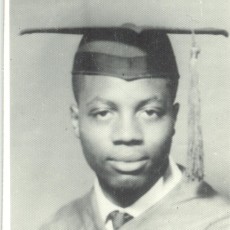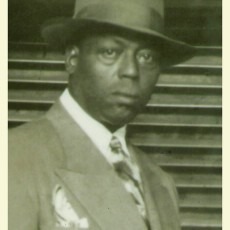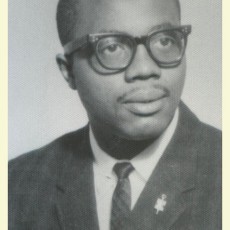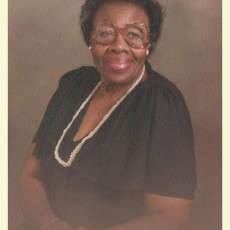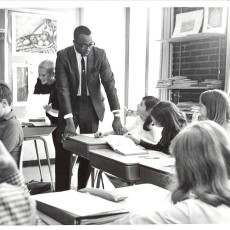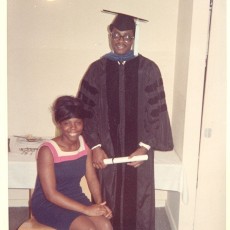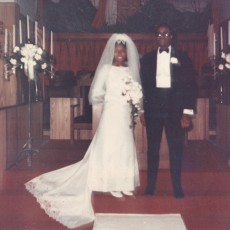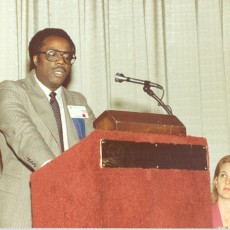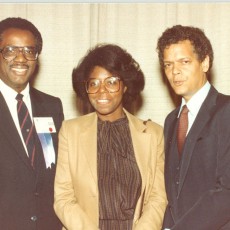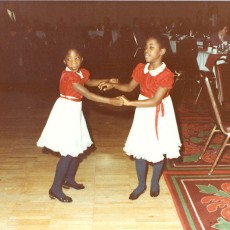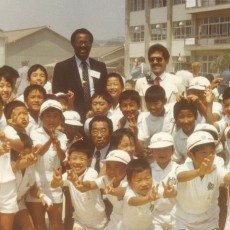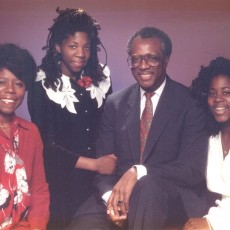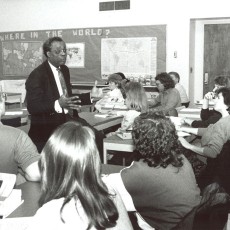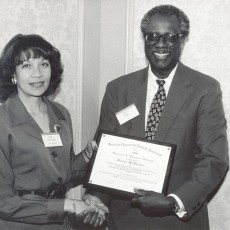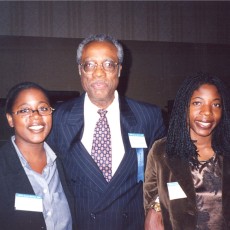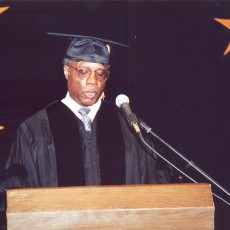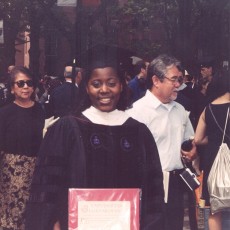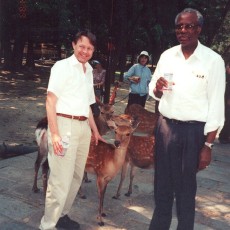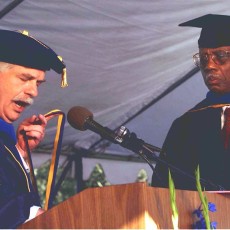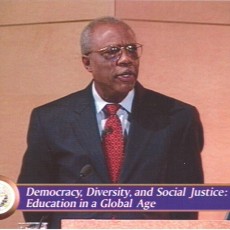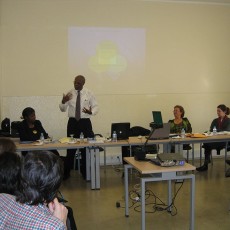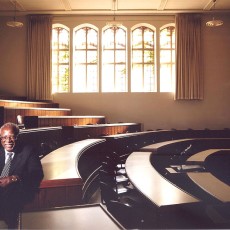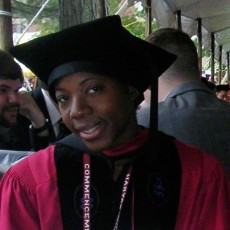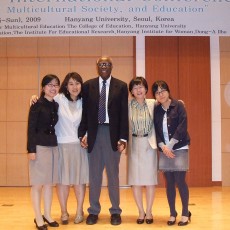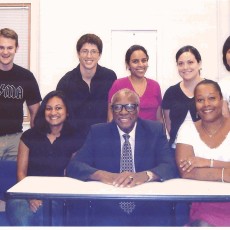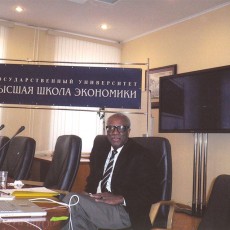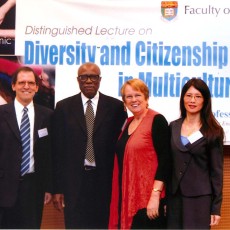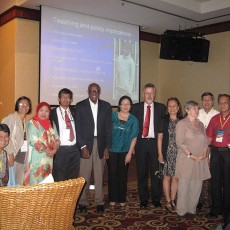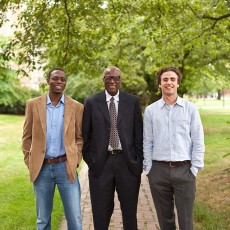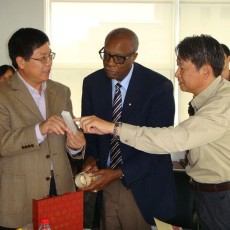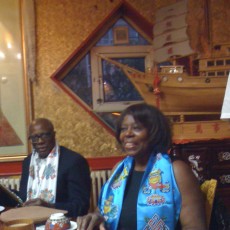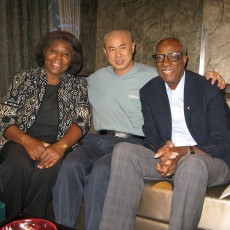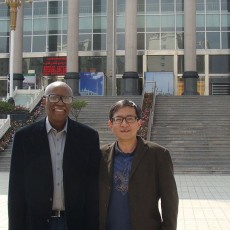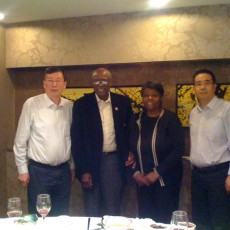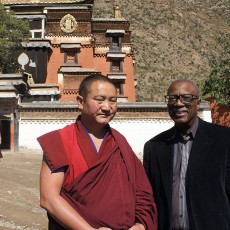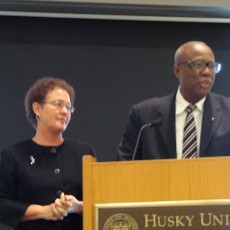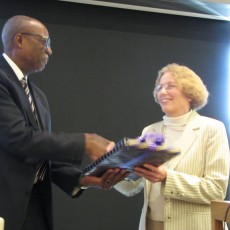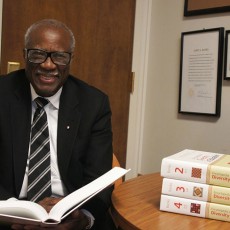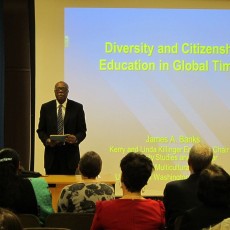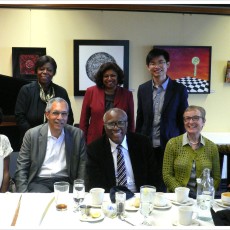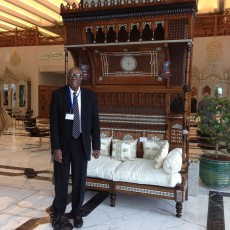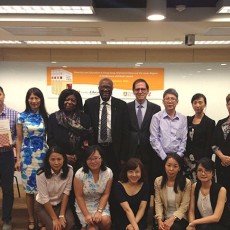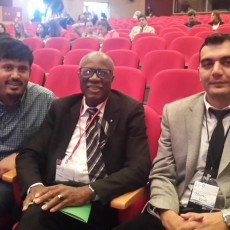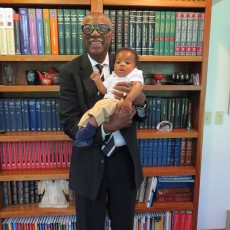James Banks
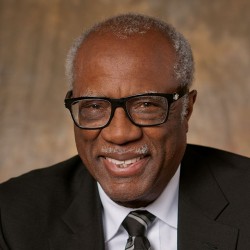
James A. Banks is Kerry and Linda Killinger Endowed Chair in Diversity Studies and Director of the Center for Multicultural Education at the University of Washington. As a former elementary school teacher, renowned social studies methodologist, and strong advocate for social justice issues, Banks is widely recognized as the “father of multicultural education” for his pioneering research and distinguished contribution to the development of the field. He also serves as the editor, with Dr. Cherry A. McGee Banks, of the award-winning Handbook of Research on Multicultural Education (2nd Edition, 2004). As a past president of the American Educational Research Association (AERA) and the National Council for the Social Studies (NCSS), Banks has worked as a consultant and lectured widely in the United States and abroad. Recognized for his exemplary educational research and scholarship, Banks has been elected to the National Academy of Education and received numerous other awards and honors including honorary degrees from six colleges and universities. He received Distinguished Career Awards from both the AERA (1996) and NCSS (2001) and was honored as the first recipient of the AERA Social Justice in Education Award (2004) for his lifelong commitment to advancing social justice through education research. Throughout his extensive publishing career, he has authored or edited more than 100 journal articles as well as 60 book chapters and 20 books, including most recently: Cultural Diversity in Education: Foundations, Curriculum, and Teaching (6th Edition, 2015); Race, Culture, and Education: The Selected Works of James A. Banks (2006); Educating Citizens in a Multicultural Society (2nd Edition, 2007); Teaching Strategies for Ethnic Studies (8th Edition, 2009); and An Introduction to Multicultural Education (5th Edition, 2014). Banks is also the editor of the Encyclopedia of Diversity in Education (2012) and the Multicultural Education Series of Books (Teachers College Press) which includes 57 published books, to date, with others in development. [/Expand]
For more information, visit James Banks’s Website. To learn more about James Banks from his family and friends, visit his reflections. To view photographs from James Banks’s personal collection, visit his photo gallery.
Curriculum Vitae Suggested readingsVisit the video below to watch a short overview of the interview with James Banks. Otherwise, see all four of the full interviews with James Banks below.
Video Interviews with James Banks:
Growing up in a segregated farming community in the Arkansas Delta, Dr. James Banks describes his experiences as a young child. Although his school was five miles from home, he recalls pleasant memories of time spent walking with friends each day. As a conscientious and hardworking student, Banks became keenly aware at an early age of the unequal and inequitable opportunities available to African American students in poverty. Having watched “bright kids fall by the wayside,” Banks developed a strong commitment to social justice issues that shaped his life and work as a classroom teacher, university professor, and educational scholar. Having met his wife, Dr. Cherry A. McGee Banks while they were students at Michigan State University, Dr. Banks also shares his passion for increasing equality and justice with their two daughters. Watch this clip to hear more from Dr. Banks about his long journey to the academy, the lessons he learned in his early years as a professor, and his advice for graduate students who also hope to change lives.
Often recognized as “the father of multicultural education” for his profound contribution to the field, Dr. James Banks finds the compliment both flattering and humorous, noting that other scholars also share his career-long dedication and commitment. Recalling his experiences providing professional development training to teachers, Banks describes the five dimensions of multicultural education as a way to help teachers, especially those in math and science, apply the concepts in their curriculum. Also serving as co-editor (with his wife, Dr. Cherry A. McGee Banks) of the groundbreaking Handbook of Research on Multicultural Education, he describes the publication as an effort to integrate the research and legitimize the field. In this clip, Dr. Banks shares the story of The Three Little Pigs to illustrate the importance of persistence and describes the reforms still needed to transform K-12 education.
Reflecting on his scholarship focused on global citizenship, Dr. James Banks describes the need for “unity in diversity” to help students become more effective citizens. He emphasizes the importance of conceptualizing ways students can embrace their dual identities in an increasingly globalized society, suggesting that “world problems cannot be solved with national solutions.” Banks also identifies social class differences as one of the most pressing issues facing the nation and shares his hope that his students will continue the struggle to help the ideals of equality and equity become a reality. Unaware at times of the profound impact of his research around the world, he describes the “rock star treatment” he has received when traveling abroad as “humbling, satisfying, and surprising.” In this clip, hear more from Dr. Banks about the importance of thinking globally as he shares his hopes for the future.
When recalling some of those who have had the greatest impact on his life and work, Dr. James Banks notes his close relationships with his mother and his siblings. Also grateful to his Black teachers for their faith in his abilities, he continues to be inspired, championing ways to address the unresolved issues of race and poverty. If he had chosen another profession, Banks notes he would have considered political service as a means of enacting change-a lifetime commitment also reflected in his favorite words “freedom” and “possibilities.” He adds that he was always meant to be a teacher and encourages graduate students and young scholars to choose an area of research based on their passion and interests, and then stay the course. In this clip, learn more from Dr. Banks about the historical figures who have shaped his work as a scholar and the need to rethink current policies in education, especially in terms of the relationship between tests and teaching.
Amrein-Beardsley, A. (2014, March 15). Inside the Academy video interviews with Dr. James Banks [Video files]. Retrieved from /inside-the-academy/james-banks
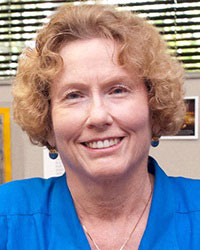
Dr. Diana Axelsen
Dr. Diana Axelsen describes her experience working with Dr. James Banks as his development editor for the Encyclopedia of Diversity in Education, a four-volume work published in 2012 by SAGE Publications, as a pleasure, noting that his commitment to equal opportunity in education is embodied in the content of the project. Citing his diligence in creating an encyclopedia containing nearly 1.5 million words, she adds that the “daunting task required not only outstanding scholarship, but also exceptional organizational skills and almost limitless patience and persistence.” Jim reviewed all 695 entries, specifically addressing “diversity defined broadly to include race, ethnicity, social class, gender, and sexual orientation (LGBT), religion, language, and exceptionality” and emphasizing “the dynamic relationships between these forms of diversity and…the global context in which they are embedded.” She quotes a review in the Library Journal as reflective of the encyclopedia’s impact: “This landmark study serves both as a history of where we’ve been and a road map to where we need to be.” Characterizing Jim as a leader in the development of multicultural education as a field, Diana also describes him as a thoughtful friend. She recalls Jim’s concern during her hospitalization as illustrative of his determination when the switchboard operator refused to connect his phone call to her hospital room. Persistent in his efforts, Jim demanded to speak to multiple supervisors “going high in the hospital hierarchy” until they granted his request. Diana recalls the good laugh she shared with Jim afterwards, noting that the switchboard operator and hospital staff “really didn’t have a chance!” Reflecting on the opportunity to collaborate with Jim over the years, Diana summarizes the experience as “not only rewarding and meaningful, but also a joy,” adding that Jim’s commitment, his collaborative and inspiring approach to working with hundreds of contributors, his ability to resolve issues both large and small, his patience, and his steadfast graciousness aptly reflect his character as an outstanding scholar and cherished friend.
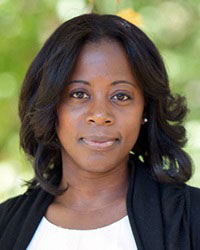
Angela Banks
Characterizing her father, Dr. James Banks, as the “living demonstration of the values that [she] holds most dear,” Angela Banks explains that he is “a self-professed workaholic, but family is a priority.” She recalls that he “read to her and her sister every night growing up [and] would review papers for school, explain complicated math concepts, and perhaps most importantly provide common sense advice.” She cannot remember her father “missing a band concert, dance performance, science fair, or any other event that she participated in,” although she adds that “true to his nature, [he sat] in the audience at one of her junior high school band concerts with a stack of papers he was either grading or editing while he waited for the performance to start.” Angela also notes a shared interest, explaining that her father claims she inherited her love of shoes and handbags from her paternal grandmother but citing his extensive collection of briefcases as evidence that she really takes after him! Reflecting on her father’s early school experiences, she describes the “frustration he had growing up about the portrayal of African Americans in school textbooks and [how he] turned it into a field of study.” She adds that “because of that field of study, her textbooks and K-12 education were vastly more inclusive than his.” When capturing the essence and nature of her father, Angela explains that “he embodies what he advocates, and that is for people to know, to care, and to act.”
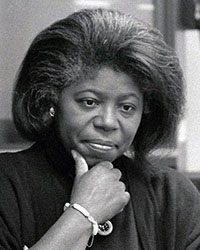
Dr. Cherry A. McGee Banks
Dr. Cherry A. McGee Banks characterizes her relationship with her husband, Dr. James Banks, noting that they are a team and as such they are also “partners, parents, friends, and professional colleagues.” Having married when they were young, she adds that “in many ways [they] have grown up together,” sharing “similar values, life goals, and a desire and willingness to support each other.” Through their numerous collaborative writing and consulting projects over the years, Cherry explains that she generally reads and provides feedback on everything he writes. She notes that overall they “value each other’s counsel and respect each other enough to stop and try to understand when [they] encounter points of disagreement.” She summarizes the nature of their relationship, adding that “we like each other.” Explaining that Jim is “known for his intensity and for being a workaholic,” Cherry adds that those who work with him on projects “know that he drives others as hard as he drives himself”-in fact colleagues often joking ask whether she has heard from her husband about her deadline! She attributes this characteristic to some extent to his early socialization working on his parent’s farm, recalling that “at the end of a long day after he had finished all of his work, his father would often tell him to feed the hogs while he rested.” Now considered a family joke, Jim often applies these instructions when he multitasks: “I am going to do X, Y, or Z while I rest.” Cherry notes that Jim displayed many of the same characteristics he exhibits today when he was a child. Referred to by many adults in his farming community as “professor,” he demonstrated a love of reading and aptitude for writing. She recalls that he also once “built a bookcase and then ordered books to fill it” and became a ghostwriter for his mother “who was known for public speaking in their community.” Cherry adds that he served as the founding editor of his junior high school and high school newspapers-he actually wrote the gossip column! Having devoted his professional life to building multicultural education as a field, Cherry cites his most significant personal accomplishment as their two daughters, Angela and Patricia, both of whom are Harvard educated, well-adjusted, and successful. Also appreciated for his generosity towards his colleagues, Jim has also supported his students and many junior scholars who have since become leaders in the field. In addition to “being very smart,” Cherry characterizes her husband as “a southern gentleman [who] is always well dressed, polite, and kind.”
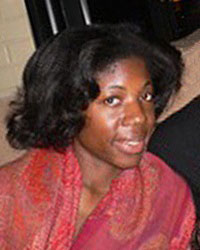
Dr. Patricia Banks
Dr. Patricia Banks describes her close relationship with her father, Dr. James Banks, as “grounded in a deep love of learning,” noting that since all of their immediate family members are professors, “intellectual life is often at the center of family conversations and interactions.” Patricia also recalls humorous memories of him reading bedtime stories to her and her sister. They both loved the Brer Rabbit trickster tales for not only “the clever wisdom embedded in the stories, but also because [their] father would read the Brer Rabbit parts in a special voice that would always leave [them] in fits of laughter.” She also remembers him writing in his study downstairs. Even when she and her sister “interrupted [him] for play breaks,” she notes that he always handed them a piece of white paper attached to a brown clipboard with a pen and invited them to join him. Although she describes their early writing as mainly “doodles and drawings,” Patricia notes that as they grew older their writing become more in-depth. She “credits those moments with engendering [her] own passion for writing and scholarly commitment to investigating cultural boundaries,” adding that her sister would agree with that sentiment. Characterizing the essence and nature of her father as “hardworking, brilliant, pragmatic, optimistic, and kind,” Patricia cites his “ability to combine a rich family life and a life dedicated to increasing equality and justice” among his most significant accomplishments.
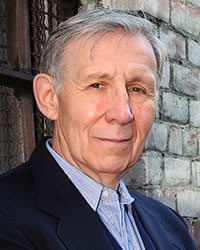
Dr. Carlos Cortés
Dr. Carlos Cortés recalls first meeting his longtime friend and colleague, Dr. James Banks, over four decades ago while serving on the Social Studies Textbook Review Task Force, appointed by the California State Board of Education. Having since delivered keynote addresses together at conferences, having served on various education committees, and having team-taught in school districts in the area of multicultural education, Carlos describes Jim as being “from another planet when it comes to energy, productivity, and creativity.” Recounting their experience teaching a year-long introductory course for public school teachers and administrators in Portland, Oregon, Carlos remembers returning to the hotel after “one particularly grueling full day of teaching.” After eating dinner and watching a basketball game on television in his adjoining room, Carlos was surprised to receive a phone call from Jim just a few hours later, requesting that his friend “read something he had written since dinner!” Carlos added that “Jim is one of the few academics that [he] will never try to keep up with.” He recalls another story while teaching with Jim in Portland, explaining that “he introduced the concept of multicultural education to participants by using a short version of The Three Little Pigs”-the lesson was “as masterful as it was unexpected.” Reflecting on Jim’s most significant accomplishment, Carlos cites “his leadership in pioneering, conceptualizing, and legitimizing the field of multicultural education…[which] without Jim, would not have become as much of a force for educational reform.” Noting that he “is a thoughtful, incredibly analytical guy, who is constantly expanding his intellectual boundaries,” Carlos explains that his friend “simultaneously maintains a deep commitment to the quest for social justice.” Carlos notes that Jim “is truly unique” in his ability to maintain the “high quality of everything in which he gets involved,” adding that he “has never met anyone else in his league.”
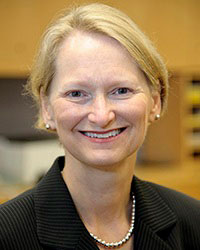
Dr. Margaret Crocco
Long before she actually met Dr. James Banks, Dr. Margaret Crocco notes that she had read much of his work in social studies. As a teacher educator, she recalls his many publications as a staple in her courses in teacher education, adding that he “helped us think differently about what was being taught in New York City’s schools and the ‘canon’ taught in schools across the country.” She describes her first meeting with Jim to conduct an interview for a publication about “how he had developed his thinking from the early writing in ethnic studies to later theoretical work on transforming schools and curriculum to make them more multicultural.” Margaret recounts Jim’s invitation to visit the University of Washington where she presented Teaching the Levees, a recently published curriculum based on Spike Lee’s film about Hurricane Katrina, When the Levees Broke. Margaret describes the trip as “an intellectually exciting event in many ways,” adding that Jim and his wife Cherry were generous and lovely hosts who shared the beauty of their campus and the city of Seattle. She also notes that “every time she sees Jim he gives her a flyer or postcard about a recently published work or a booklet summarizing research from his Center on Multicultural Education,” adding that he is a “classy role model of graceful and appropriate academic self-promotion.” Also noting her friend’s love of typologies, Margaret explains that his “strong social science tradition of thinking conceptually and theoretically about phenomena” is a “great boon to those teaching his work.” According to Margaret, Jim’s “categorization and use of typologies as a heuristic to make complex phenomena more comprehensible” is part of his “brand.” In addition to his “legacy as the foremost multicultural scholar” in the field, she also characterizes Jim as a “prodigious writer, world traveler, and intellectual leader whose contributions to education have been felt on almost every continent.” Capturing his essence and nature as “a visionary thinker, wonderful teacher, and skillful leader,” Margaret explains that Jim “has very high standards, which he applies as much to scholarship as to the choice of wine at dinner”-she is proud to call him a friend.
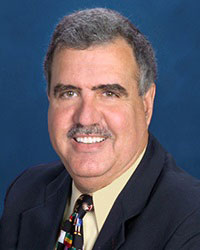
Dr. Carlos Diaz
Describing his longtime academic colleague, Dr. James Banks, first and foremost a close personal friend, Dr. Carlos Diaz met Jim in 1973 when Jim was conducting a workshop for teachers for the Palm Beach County Schools at Glades Central High School in Belle Glade, Florida. Carlos recalls that first meeting, explaining that “the details of that day so long ago are indelibly etched in [his] mind.” Jim asked him “questions about himself and his Cuban origins and, as soon as he answered one question, Jim had three more waiting.” He adds that his friend’s “curiosity is combined with a deep desire to use knowledge to improve the human condition; particularly for those on the margins of society.” Characterizing Jim as “a brilliant and highly self-motivated person who is humble at heart,” Carlos notes that in spite of Jim’s many accomplishments, “he knows deep down that none of us got to where we are by ourselves, because we stand on the shoulders of giants.” He explains that “from very humble origins in the Arkansas Delta, Jim has reached the heights of academia in this country.” Carlos adds that “Jim’s intellect and thirst for new knowledge never abated.” In fact, Carlos “suspects that if Jim had been an actor, in addition to a number of Academy and Golden Globe Awards, he would [also] have won a Lifetime Award from the academy”-he “certainly deserves one from academia.” According to his friend Carlos, “it is safe to say that if anyone deserves the label of the father (or mother) of modern U.S. multicultural education, that person has to be Jim Banks.” Explaining that “Jim is as close as [he] has to a big brother,” Carlos describes their friendship over the years, noting that they have attended many conferences, visited each other’s homes, and shared experiences as fathers to two and three daughters respectively. Recalling Jim’s visit to see the Diaz family in South Florida, Carlos and his wife Diane wanted to treat their guest to a special dinner. Having baked lobster in garlic butter, Carlos recounts the meal, noting that Jim hesitated to taste the dish. Realizing he liked the lobster after all, Jim has now “developed a taste for delicacies from the sea.” Also explaining that Jim is “a highly driven individual and far more organized than the rest of them,” Carlos describes his friend’s propensity for arriving early at the airport, at least 2-3 hours before the flight, long before the days of increased airport security. Even though he thought they would have far more time than was needed, Carlos always obliged, adding that he “seriously doubts that Jim has ever missed a flight” for being late. Although one would be “hard pressed to pick out Jim’s biggest accomplishment,” Carlos summarizes the sentiment of many, characterizing Jim’s “major influence simply as the single most influential scholar in the field of multicultural education in the world.” Yet despite his distinguished contributions, Carlos adds that “Jim Banks has never forgotten his roots,” and he is “immensely proud to call him a friend.”
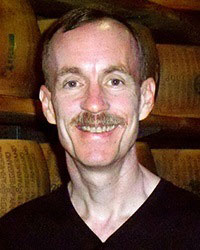
Brian Ellerbeck
As the editorial liaison at Teachers College Press for the Multicultural Education Series, Brian Ellerbeck has worked with Dr. James Banks to “shepherd book ideas through the pre-contractual process and conceptually edit the manuscript once the drafts are submitted for publication.” Collaborating closely with Jim to invite authors to submit proposals, conceptualize ideas for new books, and develop thoughts on directions for the field, Brian explains that “Jim has done nothing less than transform the content and direction of educational research and practice in this country, and increasingly, across the globe.” Brian adds that Jim “has created a field of inquiry within education, multicultural studies, that has broadened immeasurably our understanding of how race, class, gender, sexual orientation, and ethnicity impact education and the civic spaces in which we dwell.” More recently examining “the impacts of global citizenship…[and] given that education is critical to the construction of civic awareness and engagement,” Brian explains that Jim’s work “lies at the heart of making and remaking our democracy, and our world.” Brian notes that Jim “has not only left a lasting legacy of scholarship, but has also nurtured generations of scholars whose work is also adding to the knowledge base.” Brian also characterizes Jim as a gracious friend, noting that they meet for dinner each year at the American Educational Research Association (AERA) conference. Recalling their humorous dining experience in San Diego, Brian explains that he “happens to like good food very much” and “devotes care and attention to the task of finding an appropriate dinner venue.” Selecting a restaurant reasonably close to the conference that also allowed for a relaxing meal and focused conversation, Brian thought he had selected “the perfect dinner spot.” Realizing after riding in the taxi for more than 30 minutes that the location was much further than he had anticipated, Brian added that “Jim was more than gracious, but they have been talking about the long taxi ride every year since.” Now Brian is “sure to Google map the spot before making a reservation!” Characterizing his friend and colleague as “a true visionary [and] a scholar of first rank whose insights have fundamentally reshaped our understanding of education and citizenship in a global context,” Brian adds that Jim has followed “in the footsteps of such luminaries as Dewey and DuBois, broaden[ing] the scope and aims of the conduct and purpose of education and show[ing] generations of readers how in a contested and unequal milieu we can bring the urgent remedy of democracy-in-action for all citizens, both within and across nation-states.”
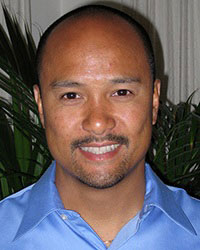
Dr. Zeus Leonardo
Dr. Zeus Leonardo describes his relationship with Dr. James Banks as both professional and personal, noting that they first met at California State University-Long Beach where Zeus was an Assistant Professor who had been reading and teaching Jim’s work in his classes. Characterizing Jim as a “gracious and generous human being, full of energy, and personal interest in people,” Zeus adds that “over the years, interactions with him confirm his initial impression that [Jim] possessed something of a black southern gentleman’s ways, at once gallant and charming.” Zeus considers Jim both a colleague and mentor, not so much for giving advice but “as a model for professionalism through his actions.” When he received a personal invitation from Jim to serve as the Acting Director of the University of Washington’s Center for Multicultural Education and Visiting Professor while he was away as a Fellow at Stanford University, Zeus recalls joking that he “would need ‘thick socks’ to fill in the big shoes he was about to step into.” Having enjoyed a year interacting with wonderful colleagues, Zeus explains that he “still has a soft spot for Seattle today, a feeling [he] owes to Jim’s kind invitation.” Adding that Jim “strikes him as a devoted family man,” Zeus recalls sharing the dinner table with him and his wife Cherry and observing their “enviable relationship,” adding that they “seem to enjoy each other’s company in the way only a couple who have been together a long time can achieve.” Zeus also describes his ride around the Seattle streets with Jim in his classy, sporty Mercedes Benz. Reflective of his modest side, Jim seemed to feel “self-conscious driving it,” but Zeus reassured him that as a Los Angeles resident he “could appreciate driving a nice car,” but joked that he was a little “miffed that he wasn’t asked to take the wheel!” Describing Jim as “a true professional,” Zeus notes that “his character is rare these days and may be a dying breed”-he is a “man of manners and distinction…formal but not stuffy, serious but not detached.” According to his longtime friend, Jim “takes himself seriously as well as the person across the table from him,” adding that “he doesn’t demand respect because he commands it.” Zeus explains that “anyone who knows [Jim] will notice his hearty laughter and zest for enjoying good company.” Jim “is [also] an ambitious man who does not mind spreading the wealth,” especially with regards to “bringing with him the next generation of scholars.” Zeus appreciates Jim’s support of his own work, citing the opportunity to publish his book, Race Frameworks, in the Multicultural Education Series. Adding that Jim’s series “provided the space for [him] to put ‘critical theories of race’ on the radar of multicultural researchers or practitioners who might otherwise not be familiar with it,” Zeus describes his mentor as “an open intellectual [and] a trailblazer…whose actions speak louder than his words.” Citing “the fact that his name and multiculturalism go together,” Zeus explains that multiculturalism has been “virtually the ‘common language’ of schools for twenty years,” a transformation that would “not have occurred without Jim’s insights, influence, and leadership.” For Zeus and a whole generation of scholars, Jim “opened a space [for them] to promote diversity both in schools and knowledge production…not only in the sense of adding previously neglected populations and their perspectives into the mix and stirring the pot.” Rather, Zeus explains that Jim “transformed the entire enterprise of education itself, its goals and objectives” and yet he is a “consummate scholar, colleague, and teacher whose integrity is more important to him than any recognition he could earn.”
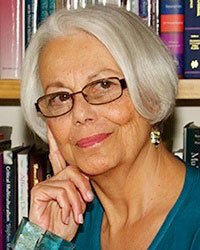
Dr. Sonia Nieto
Noting that she was first introduced to Dr. James Banks through his scholarship, Dr. Sonia Nieto recalls reading his inspirational early work, including Teaching for Ethnic Studies. She describes her surprise at receiving a personal invitation from Jim to review his chapter on Puerto Rican students for the next edition of the same book. Recommended to him as “someone who was knowledgeable about both education and the Puerto Rican community,” Sonia was thrilled at the opportunity and spent three weeks writing a 17-page review of the 10-page chapter! Adding that she “wanted to make sure that [she] was thorough and helpful,” she remembers that Jim wrote to her soon thereafter, noting that “he had never received such a comprehensive review.” This first interaction began a “long and productive relationship” during which Sonia and Jim have spoken together as conference panelists, served on editorial boards, and collaborated on numerous writing projects. Sonia also notes that she has “been pleased to get to know and work with his long-time collaborator and wife, Cherry McGee Banks.” Sonia describes Jim as “a serious scholar [who] always reminds audiences that he’s a ‘Southern boy’ with the attendant proper manners and demeanor that such an identity require.” In addition, Sonia cites his “passion for punctuality and his obsession for organizing everything down to the last detail.” When serving on panels, Jim “makes sure to tell each panelist exactly how many minutes they have, and he starts getting fidgety when [they] go over by minute or two”-a trait Sonia notes “is really quite charming.” She also notes his thoughtfulness as he always surprises her with an email message or phone call within a day or two after she publishes a new book or a review of her work appears in a journal. Sonia always wonders, “How on earth does he keep up with so many things?” She adds that he is also “quick to correct people who call him the ‘Father of Multicultural Education,’ reminding them that many people have helped shape the field.” Acknowledging that “he is right, of course,” Sonia notes that “he has a very special place among [them]…because his focus has not been on making a name for himself but rather on developing the field, making certain that it has credibility, integrity, and that it’s taken seriously.” Although his work has been cited thousands of times, Sonia explains that most importantly for Jim, “teachers and school systems [have] create[d] significant curricular, pedagogical, and structural change that benefits all students but especially those who’ve traditionally been marginalized, overlooked, or neglected by our schools.” Each of his edited handbooks on multicultural education and diversity “has been a massive undertaking, largely thankless and without much in terms of monetary gain, but they have all helped define the field and make it easier for young scholars to have a solid foundation as they contribute their own insights and research to the field.” Sonia appreciates his support in her own research, noting that he encouraged her to write a book on multicultural education despite her hesitation to “compete” with his own scholarship. In response to her concern, Jim insisted that “we need all the competition we can get! We need to build up this field, and the more good books we have, the better.” To Sonia, Jim’s encouragement of her work and that of other scholars embodies his essence and nature as a mentor, colleague, and friend.
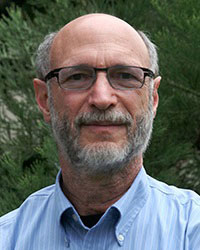
Dr. Alan Schoenfeld
Dr. Alan Schoenfeld describes his relationship with his friend and colleague, Dr. James Banks, noting that he preceded him as president of the American Educational Research Association (AERA) and mentored him in the position. Noting that Jim has “devoted his career to issues of equity and multicultural education,” Alan cites the Handbook of Research on Multicultural Education, co-edited with Cherry McGee Banks, as “testimony to the influence and the impact of his work.” Although Alan “can’t say that [he] could teach Jim anything about academic matters,” he suggests that “it just may be because of their collaborations that the quality of wine at AERA occasions-and maybe even the Banks household-went up a notch.” First and foremost, Alan describes his longtime friend as “a true gentleman” who is “passionately committed to a set of ethical values, but works his way with quiet patience and determination, and a generous human spirit.”
